2. Arab-Israeli conflicts, 1956 to 1973
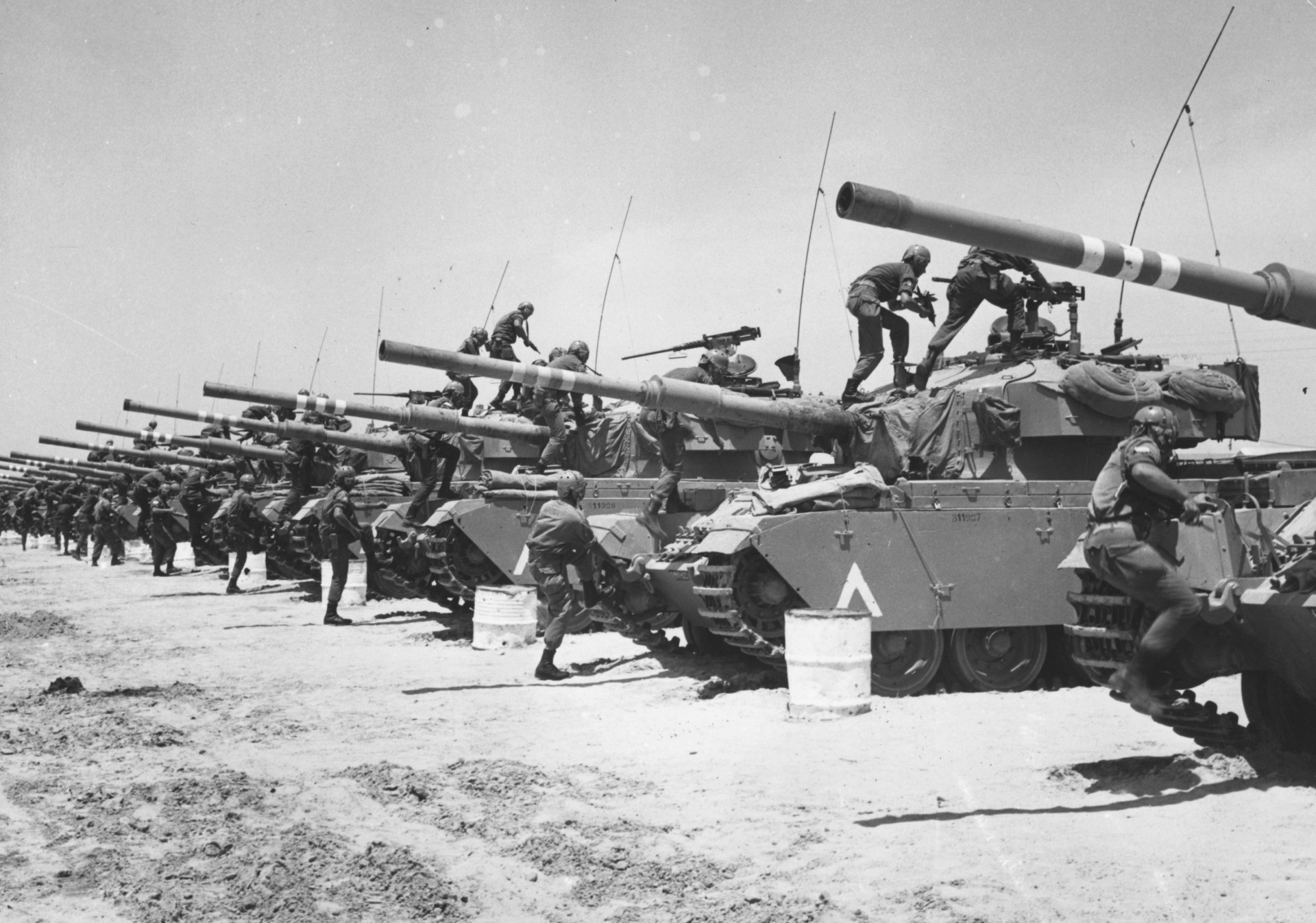 This page examines the causes and consequences of the military conflicts that took place between Israel and the Arab states in 1956, 1967 and 1973.
This page examines the causes and consequences of the military conflicts that took place between Israel and the Arab states in 1956, 1967 and 1973.
Guiding questions:
What were the causes and consequences of the Suez Crisis?
What were the causes of the Six Day War?
What were the results of the Six Day War?
What were the causes of the Yom Kippur War?
What were the results of the Yom Kippur war?
1. What were the causes and consequences of the Suez Crisis?
This map shows the strategic importance of the Suez Canal. By traveling through the Suez Canal, ships could considerably shorten the journey from Europe to the Middle East; by 1955 approximately two-thirds of Europe's oil passed through the canal.
//news.bbc.co.uk/1/hi/world/middle_east/5195068.stm
Starter:
Watch the first 7 minutes of the video 'The other side of Suez' below.
What can you learn about:
- The significance of this crisis?
- The character and attitude of Prime Minister of Britain, Anthony Eden?
- Britain's position in Egypt?
- Abdul Nasser?
In 1956, the Egyptian President Gamal Abdel Nasser rose to power after General Neguib had dethroned the Egyptian monarch in a military coup. (You will cover this more on the next page which focuses on Egypt).
Task One
ATL: Research and Thinking skills
In pairs, research further the reasons for the rise to power of Nasser. In your research consider the following:
- The impact of the 1948 - 49 war on Egypt and how this impacted on relations with Israel
- The attitude of Egyptians towards the defeat of the Arab forces in the 1948 - 49 war
- The actions of the Free Officers group in overthrowing King Farouk
- Nasser's aims for Egypt
Task Two
ATL: thinking skills
Continue watching the video above from 7 minutes to 15 minutes
- How did Nasser plan to improve the lives of Egyptian people?
- What was the reaction of the US and the British to this?
- What actions was Israel taking at this point to strengthen itself?
- Why did Nasser ask Khrushchev for weapons?
- Why is this 'a triumph' for Khrushchev?
- What arguments are given to suggest that Nasser is not in fact a communist?
- What actions do the British and Americans now take against Nasser?
- What do MI6 reports suggest about Nasser?
Supported by Soviet arms and funds, and furious with the USA for withdrawing their promised financing for construction of the Aswan Dam on the Nile River, Nasser ordered that the Suez Canal be seized and then nationalized.
Note that there is a very good BBC docu-drama, Suez: A very British Crisis. Timings and questions for this can be found on the video page for this section: 9. Post-war developments in the Middle East: videos
Task Three
ATL: Thinking skills
Read the source below:
From a Speech delivered by Gamal Adel Nasser in Alexandria, July 26 1956:
Our rights in the Suez Canal have been restored to us after 100 years. Today, we actually achieve true sovereignty, true dignity and true pride. The Suez Canal Company was a state within a state. It was an Egyptian Joint Stock Company, relying on imperialism and its stooges. The Suez Canal was built for the sake of Egypt and for its benefit. But it was a source of exploitation and the draining of wealth . . .
Questions:
1] What is the message of this source? (think about Egyptian sovereignty, colonialism, regional power, profits, and the Bandung Conference).
2] Research the Bandung Conference. What significance does this have to Nasser’s nationalisation of the Suez Canal?
3. Discuss in pairs: Following Nasser's nationalisation of the canal, what actions could the British now take?
Task Three
ATL: Thinking skills
Read the source below and answer the questions which follow.
From a letter sent by British Prime Minister Eden to US President Eisenhower on 5 August 1956:
Nasser has embarked on a course which is unpleasantly familiar. His seizure of the Canal was undoubtedly designed to impress opinion not only in Egypt but in the Arab world and in all Africa too . . . I have never thought Nasser a Hitler, he has no warlike people behind him. But the parallel with Mussolini is close . . . The removal of Nasser and the installation in Egypt of a regime less hostile to the West, must therefore also rank high among our objectives
1] What does this source indicate to you about Eden’s motives for taking action against Nasser?
2] What might this source suggest to you about British foreign policy in the region?
As you can see from the source above, Eden was furious with Nasser believing that Nasser's plan was to 'expel all Western influence and interests from Arab countries'. The French, who accused Nasser of helping rebels in their colony of Algeria, agreed. The two countries thus decided on a military invasion of the Suez Canal zone. Israel was also unhappy with Nasser who was training Fedayeen guerillas to carry out attacks in Israel; it wanted to force Egypt to end the raids from Gaza and force Egypt to recognise the state of Israel and to break their blockade of the Tiran straits.
On 24 October the British, French and Israelis met secretly in France to plan a joint campaign against Egypt.
Task Four
ATL: Thinking skills
Watch the video below on the plan to attack Egypt and the key events of the crisis:
President Eisenhower had not been part of the secret plan agreed between Britain, Israel and France and was taken by surprise when the Israeli forces invaded Egypt and then the military intervention of Britain and France.
Task Five
ATL: Thinking and communication skills
You are an adviser to President Eisenhower. It is 31 October 1956. News that Britain and France have bombed Egyptian airfields has reached the US. Write a report to the President outlining exactly what has taken place. You will need to
- give the full context of the situation and what you believe to be the aims of the different countries to be
- make recommendations to the President as to what the US' course of action should be in responding to events.
The actions of Britain and France were condemned at the UN. The Arab states halted oil supplies to the West and the US, furious at the fact that Britain and France had used force, also condemned the action and threatened ot cut off financial aid to Britain. The Soviet Union went further and threatened to use military force.
Task Six
ATL: Thinking skills
Go to this cartoon which comes from the British magazine Punch.
What is the message of this cartoon? Refer specifically to details in the cartoon to support your answer.
Task Seven
ATL: Self-management skills
There is a timeline of the key events of the Suez Crisis below.
Either print off this timeline or create you own. Using the video you have just watched add extra details of the events to your timeline.
The consequences of the Suez crisis were far reaching.
For Egypt:
Although arguably it was the American and UN intervention that had forced the Anglo-French withdrawal from the Suez the Egyptian newspapers, and especially the radio, gave the credit to Nasser and the Egypt resistance. Nasser was seen as the great hero of the Arab world. His defiance was interpreted as courageous and anti-colonialist. The Canal was cleared and eventually reopened in April 1957. Although Egypt lost territory when the Israelis captured the Sinai, the Israelis were persuaded by the Americans to withdraw early in 1957
For Israel:
The outcome of the Suez crisis was positive for Israel. They were strengthened by the events. Their raid on the Sinai had been a huge success and when they withdrew from the Sinai, the UN moved in to control the buffer zone on the Israeli–Egyptian border; this gave the Israelis increased security and significantly curtailed the activities of the fedayeen in the area. Furthermore, Nasser had to reopen the Gulf of Aqaba which meant that shipping could once again operate from the port of Eilat which is the only Israeli port on the Red Sea that is located on the northern tip of the Gulf of Aqaba. However, Egypt did close the Suez Canal to Israeli shipping activity.
For Britain:
For Britain, the Suez Crisis marked the end of British military and political influence in Egypt. It was a disastrous failure which destroyed the Prime Minister Anthony Eden’s moral reputation and his political career and, unsurprisingly in January 1957, he resigned. Britain and France had underestimated the Egyptians and Nasser as a leader and tactician. They had believed that there would be a popular uprising against Nasser once the fighting and intervention had started. The reverse, in fact, was the case. Nasser’s popularity soared.
For the Middle East
The Suez Crisis increased an already simmering distrust of the West in the Arab world. It also hardened opposition to the West and brought about greater Arab unity and nationalism. There were anti-West demonstrations and riots in many Arab cities and towns, with Saudi Arabia and Syria breaking off diplomatic relations with Britain and France. In addition, Jordan signed a military pact with Syria and Egypt. This Arab unity reached its height in 1958, when Syria and Egypt merged to form the United Arab Republic (UAR). The war also strengthened the perception that Israel was an outpost of Western imperialism. The Arabs became more willing to seek Soviet Aid and the Soviet Union now began to supply most of Egypt's weapons. The Soviets also paid for the building of the Aswan dam and other projects. (However Nasser resisted becoming a pawn of the Soviets).
For the Cold War
The Suez Crisis brought both the US and the USSR more directly into the Middle East thus further globalising the Cold War. 1957 saw the Eisenhower Doctrine which committed the US to helping any countries in the Middle East that were fighting Communism. Meanwhile, the Soviets now became more involved in funding and supporting Arab countries in the region.
Task Five
ATL: Thinking skills
Read Sources A to C below.
- What, according to Sources A and B was the impact of the Suez Crisis for Egypt?
- Compare and contrast the differing views between Sources A and B and Source C regarding the impact of the crisis for Egypt
Source A
An excerpt of Gamal Abdel Nasser’s evaluation of the Suez Crisis from his book Towards Freedom, 1959.
After Suez, we were able to take over all the foreign property in our country and therefore the Suez War regained the wealth of the Egyptian people to be used in the interests of the Egyptian people. Then, of course, it was clear for the Egyptian people that they could defend their country and secure its independence.
Source B
An excerpt from The Arabs: A History by Eugene Rogan (Allen Lane, London, UK, 2009), p.304. Rogan is a lecturer in Middle Eastern History at Oxford University, UK.
For Egypt, the Suez Crisis was the classic example of a military defeat turned to political victory . . . The very act of survival was deemed a major political victory. . . Nasser knew that his nationalisation of the Suez Canal would face no further challenge and that Egypt had achieved full sovereignty over all of its territory and resources
Source C
Extract adapted from Suez 1956: the Consequences by David Carlton. Published in Modern History Review 1990
Nasser and his followers could rejoice in the humiliation of the British and the French at the hands of the United Nations and, in particular, the United States. However, the Egyptians had also been humiliated by their military performance – at the hands of not only the Europeans but also the hated Israelis. It is also true that British influence did not in fact collapse overnight as pro-British regimes survived in Jordan and Kuwait. And Lloyd was probably correct in claiming that ‘in 1964 we were certainly as powerful in the Persian Gulf as we had been in 1956’.
See this article from BBC History Magazine for more discussion on the impact of Suez on Britain's role in the Middle East and the argument that it was not so severe as has previously been discussed.
This article from King's College, London is also very interesting on the impact of the Suez Crisis for Britain, France and the international situation.
This article also gives the international consequences of the crisis.
Task Six
ATL: Thinking skills
What, according to Westad, explains Eisenhower's actions during the Suez Crisis?
One of the key reasons why the United States had acted so angrily to the invasion was Soviet attempts at using the Suez Crisis to increase their influence among Arab nationalists and to portray their own crushing of he Hungarian rebellion in a better light...In deciding to pull the rug from under London's and Paris's actions in Egypt the Eisenhower administration knew that they were effectively ruining both the power and the will that the European countries had to defend their colonial possessions in the future. America would replace them as the major Western force all over the Third World, with a policy based on its own strategic and economic priorities.
Odd Arne Westad, The Global Cold War, CUP, 2007, pg 126
Task Seven
ATL: Thinking and self-management skills
1. Using the information above, the articles and the sources, create a mind-map such as the one below to show the impact of the Suez crisis. You can also print off a copy of the diagram below. Add any extra categories that you feel appropriate e.g. impact on Cold War.
2. To what extent do you agree that the Suez crisis for Nasser was 'a military failure but a political victory'?
Write a paragraph to explain your answer.
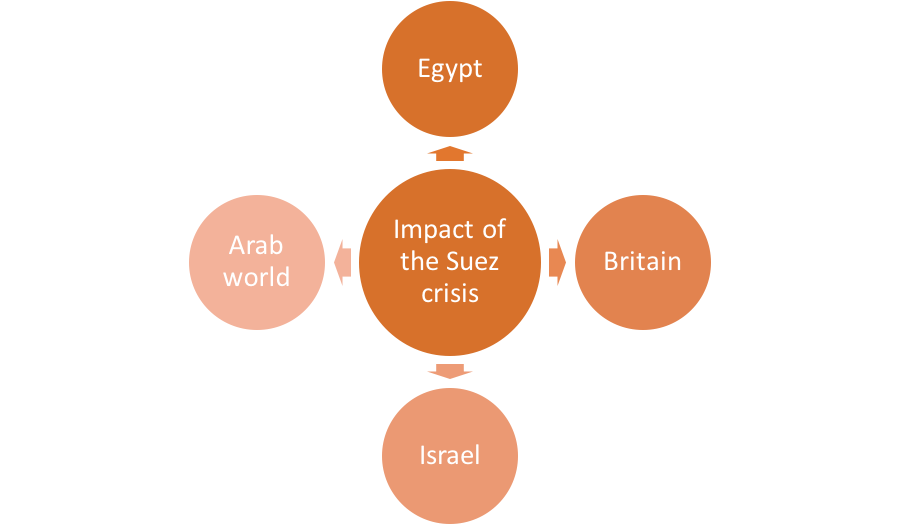
2. What were the causes of the Six Day War?
The Six-Day War took place in June 1967. It was fought between June 5 and June 10. In this war, Israel attacked Jordan, Egypt and Syria before it was itself attacked arguing that a pre-emptive strike was necessary to avoid Israel's destruction. The Six-Day War was initiated by General Moshe Dayan, the Israeli’s Defence Minister (in the photo to the left) and was to have the most dramatic of consequences of all of the Arab-Israeli wars.
Starter:
In pairs, review the consequences of the 1956 Crisis. What factors made a future war between Israel and the surrounding Arab states likely?
Task One
ATL: Thinking and self-management skills
The years 1956 to 1967 saw several key developments taking place in the Middle East which would contribute to the growing tension.
In pairs, research the following. Highlight key events and explain how these events led to an increase in tension in the region. (you may want to divide this task up between the class so each group does a different topic and feeds back)
- US and Western involvement in the Middle East
- Establishment and break-down of the United Arab Republic (UAR)
- Actions of the Palestinians
- Political and economic development of Israel
Task Two
ATL: Thinking and self-management skills
Read the following information on how tension developed between Israel and the surrounding Arab states in the years following 1956. (click on the eye)
Create a time-line to show clearly the key events leading to the outbreak of hostilities
What was the role of each of the following countries in the development of tension leading to war: Syria, Egypt, USA, Israel?
You may also want to read this account by Jeremy Bowen on the BBC website which gives more detail on some of the points below.
- Although Nasser had been seen as a hero to most Arabs in the 1950s his reputation was dwindling
- In 1958 Egypt and Syria officially merged together to form a new state - the United Arab Republic which Nasser claimed was the first step towards the unification of the whole Arab world and the destruction of Israel; however Syria pulled out in 1961 which made Nasser looked foolish
- Nasser's intervention in a civil war in Yemen in 1962 resultsed in his troops being tied down in a prolonged conflict
- By the 1960s the Syrians were accusing Nasser of cowardice in his attitude towards Israel
- In 1966, Syria's government was taken over by General Jedid and the Baath Party; Syria now became violently anti-Israel
- in 1966 and 1967, Syria allowed regular small-scale attacks on Israel
- Nasser responded to Syria's criticisms by also becoming more aggressive towards Israel; in 1967 Nasser made threatening speeches towards Israel even though Egypt was not ready for a war. A defensive pact was also made with Syria
- The new Prime Minster in Israel, Levi Eshkol was seen as being much weaker in terms of defence than his predecessor Ben Gurion which encouraged Nasser to believe that Israel would not respond to his threats
- In 1966 there were clashes on the Israel-Jordan border
- May 1967, there were clashes on the border between Syria and Israel which dramatically increased tension
- Nasser increased his threats against Israel; he did not want war but wanted to appear tough to Syria and he believed that Israel would avoid a war against both Syria and Egypt
- 13 May the USSR told Syria and Egypt that Israel was massing forces on the Syrian border ready to attack; this was untrue but increased tensions
- 15 May Nasser sent combat troops into the Sinai peninsula close to the Israeli border
- 18 May Nasser demanded the withdrawal of the UN peacekeeping troops that were along the Egyptian- Israeli border
- 22 May Nasser closed the Gulf of Aqaba to Israeli ships and said that Egypt was ready for war
- The Israelis called for Egypt to withdraw but also made plans to attack Egypt
- 28 May Jordan and Egypt formed a defence pact and put their armed forces under joint command. Iraq joined the pact a day later
- 29 May Nasser gave a speech in the Egyptian parliament in which he said 'We are now ready to confront Israel'
- 30 May Jordan signed a defence treaty with Egypt
- 31 May the Israeli Minister, Abba Evan, went to the US to find out America's attitude towards Israel starting a war (they did not want pressure yet again from the US to stop fighting as had happened in 1956). Dean Rusk, the US Secretary of state said at a press conference. 'I don't think it's our business to restrain anyone'.
- Israel reorganised itself into a 'Government of National Unity' in which all political parties had a place; the key post in the new government was given to General Moshe Dayan
- 5 June 1967 the Israeli air-force launched a pre-emptive strike and bombed Egypt's airfield destroying around 300 aircraft. Later in the day they launched attacks against other Arab air forces and by nightfall had the control of the skies in the Middle East.
Israel secured a spectacular military victory in this war, securing victory in just six days. Key to this victory was the success of the pre-emptive strike. In addition, while the Arab states had modern Soviet missiles, the Israelis had modern French fighter planes and tanks as well as the most advanced US electronic equipment which allowed them to intercept Arab communications. Israeli soldiers were highly skilled and well trained and they also knew that they were fighting for their nation's survival. In comparison, the Arab troops were less well trained and suffered from a lack of co-ordination between the different armies.
Task Three
ATL: Thinking skills
1. Watch this short BBC video which shows the key events of the war.
2. What factors allowed the Israelis to be so successful in this war?
3. What were the results of the Six Day War?
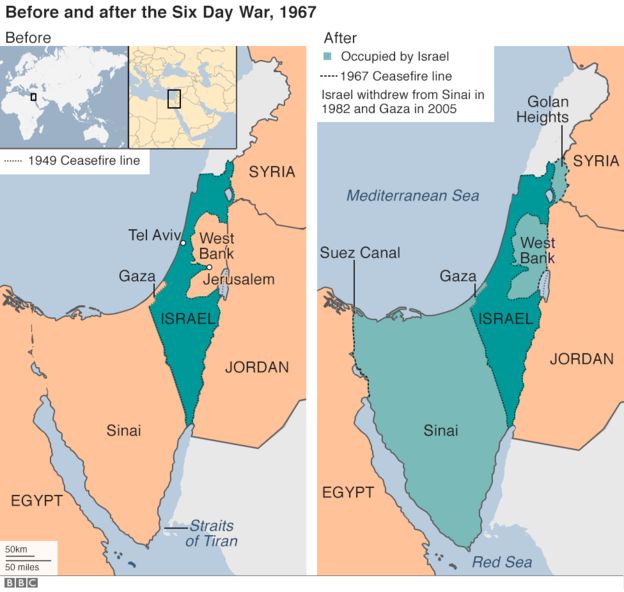
//www.bbc.co.uk/news/world-middle-east-40117270
The results of the Six Day War had profound implications for the region - results which still impact on the conflict in this area today.
Note that as the 50th anniversary of the Six Day War was in 2017, there are many articles on-line discussing its impact.
Task One
ATL: Thinking and self-management skills
Using the information below, create a mind map such as the one below to show the impact of the Six Day War. You may want to add to this later after completing the following task.
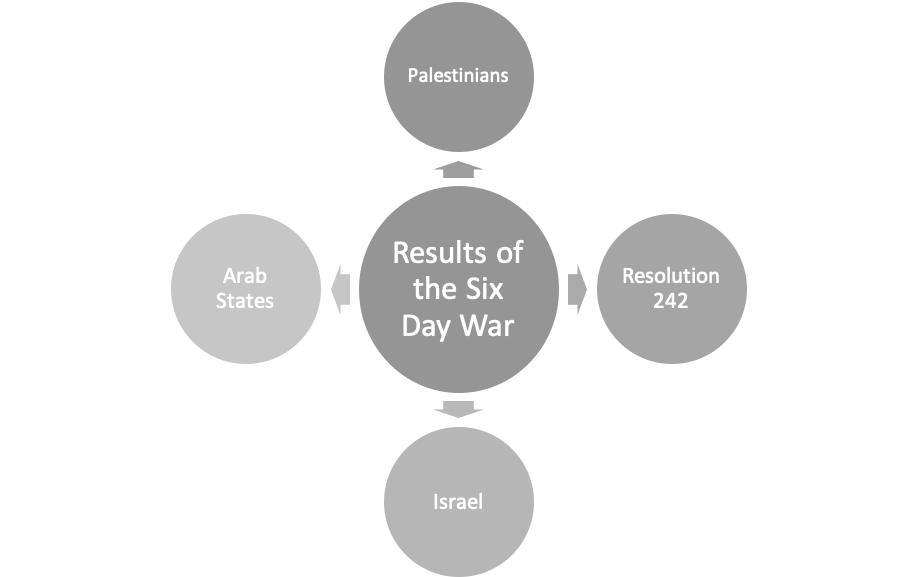
The results for Israel (see map above)
- Israel was now the dominant power in the Middle East
- It had substantially increased its territory; the areas of the West Bank, Gaza, Sinai and the Golan Heights made Israel much more secure as it now had a buffer zone between its land and each of its three enemies
- It was supremely confident (this was to play a role in its near-defeat in 1973)
The results for Arab States:
- The war had been a disaster for the Arab states with high losses of men and equipment as well as land; their pride and prestige had been crushed
- They blamed their defeat on the USA, Britain and other European powers, whom they accused of helping Israel in the war
- The USSR continued to support the Arab states by replacing and building up their weapons
- Gamal Abdel Nasser lost his standing in the Arab world
- Arab - Israeli tension increased even more; at a conference in August 1967, Arab leaders declared: 'No peace with Israel, no recognition of Israel, no negotiation with Israel'
Palestinians
- More than a million Palestinian Arabs were in the 'occupied territories' - Gaza, East Jerusalem and the West Bank and so were now under Israeli military rule
- Hundreds of thousands fled or were driven from their homes - some for a second time. Around 250 000 fled to Jordan adding to the already large population of refugees living there
- They lost faith in Arab states being able to defeat Israel; there was thus an increase in Palestinian resistance fighters
Task Two
ATL: Thinking skills
1. Read this article from the BBC on the impact of the war; it also includes first hand accounts from those involved in the war
2. Read this article from the Council for Foreign Relations: How Six Days in 1967 Shaped the Modern Middle East. It contains the views of 5 historians on the impact of this war.
3. Make extra notes on the results of the war from both sources; add key points to your mind-map.
In November 1967, the UN passed Resolution 242 (see next task for the link). It called for the withdrawal of Israeli armed forces from the territories captured in the war and also for every state to be able to live in the region without fear of attack. Egypt and Jordan accepted the Resolution while Syria rejected it. Israel, while accepting it, said it could not be a substitute for a specific agreement.
Task Three
ATL: Thinking skills
Read the UN Resolution 242 here.
The Resolution failed to bring peace to the region. What problems existed in trying to implement this resolution?
Task Four
ATL: Thinking skills
2. How did this war compare with the 1956 Suez Crisis? Consider:
- Involvement of major world powers
- Behaviour of President Nasser
- Countries which fought against Israel
- Role played by UN
- Duration of the crisis/war
- Methods of warfare
- Results of the war
4. What were the causes of the Yom Kippur War?
The Yom Kippur War of 1973, is so-called because it began on the Day of Atonement (Yom Kippur), the holiest day of prayer and fasting in the Jewish calendar. At the time of Yom Kippur, Israel was led by Golda Meir (on the right below) and Egypt was led by Anwar Sadat (on the left)

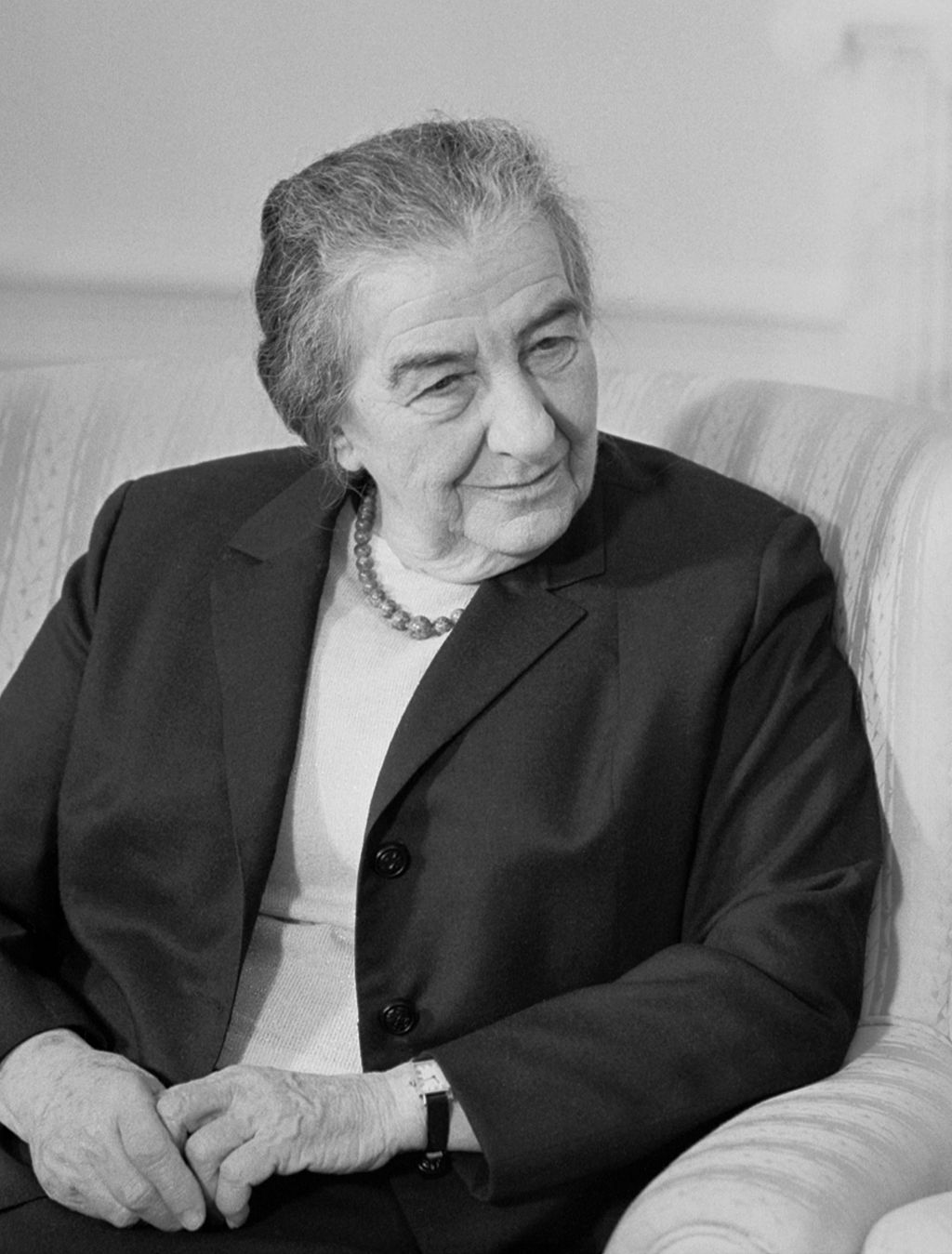
Starter:
Read the following two Israeli sources. What do these sources tell you about Israel's attitude after 1967? Why could this be a problem for Israel?
Source A
An article from a leading Israeli newspaper, Ma'ariv, 13 July 1973
Our present defence lines give us a decisive advantage in the Arab-Israel balance of strength. There is no need to mobilise our forces every time we hear Arab threats, or when the enemy concentrates his forces along the cease-fire lines..The Arabs have little capacity for co-ordinating their military and political action. To this day they have not been able to make oil an effective political factor in their struggle with Israel. Renewal of hostilities is always a possibility, but Israel's military strength is sufficient to prevent the other side from gaining any military objective.
Source B
Ariel Sharon, Israeli general, speaking in September 1973
There is no target between Baghdad and Khartoum, including Libya that our army is unable to capture. With our present boundaries we have no security problems.
As you have read, there was no peace treaty at the end of the Six-Day War. In fact, fighting broke out again between Israelis and Egyptians over the Suez Canal. The Egyptians wanted to clear the canal of sunken ships but Israel now controlled the Sinai and refused to allow this unless they could use the Canal as well. Thus many clashes took place across the Canal in a 'war of attrition'.
In 1970, Nasser died and was succeeded by Anwar Sadat. Sadat wanted peace with Israel in order to stop the ongoing conflict over the Suez Canal which was draining Egypt of money. However Sadat was also determined to get the Sinai back from Israel. Indeed, he was prepared to recognise the state of Israel in order to regain the lost land. However, the Israelis refused to discuss this (see sources above). Sadat knew that the US would be able to put pressure on Israel to enter into peace negotiations but the US were too busy with the war in Vietnam to get involved in a Middle East peace process. Sadat actually expelled all 15 000 Soviet advisers who had been training Egypt's forces. This was popular with the Egyptians, but still failed to convince the Americans to support Sadat's request for them to get involved.Sadat thus decided that war was the only way to break the existing stalemate. Weaponry and training had substantially improved due to Soviet assistance. He now also had support from Saudi Arabia and he became a close ally of the new Syrian leader President Assad. Secretly the two leaders began planning for war. On 6 October 1973 both countries attacked Israel.
Task One
ATL: Thinking Skills
In pairs, discuss the causes of this war. What factor/country do you consider were most responsible for the outbreak of war?
Task Two
ATL: Thinking skills
Watch the following video for an overview of this war. Answer the questions below - which can also be downloaded on the attached PDF.
Questions:
- What were the results of the Six-day war for
(a) the Israelis
(b) the Arabs
- What happened at the Suez Canal after 1967?
- What was Sadat’s plan? How did he go about putting it into operation?
- What was the ‘deception plan’?
- What slowed down the Israeli response to the danger?
- What were the key features of the fighting? Why were the Egyptians so successful?
- What was the importance of the Golan heights for Israel?
- What happened in the Golan heights?
- What actions did the Israelis take to resist the attack? What problems did they face?
- What happened when they counter-attacked in the Sinai?
- What were the Israelis able to do in the Golan Heights?
- Why did the Israelis have an advantage in the Golan Heights?
- What did Sadat decide to do? What happened as a result?
- Why do you think that the Israeli’s were able eventually to turn the tide?
- What were the results of the war for Israel?
- Why did Egypt gain most from this war?
This article also gives a good overview of the key events of the war.
5. What were the results of the Yom Kippur war?
The results of the Yom Kippur War once gain changed the map of the region but, as you will have seen on the video above, also set the foundations for a future peace agreement between Egypt and Israel with the support of the US.
The US Secretary of State, Kissinger with President Sadat of Egypt
The key results of this war were as follows:
- This was another victory for Israel - yet again they had proved that their military superiority. However, they had suffered more losses in men and equipment than ever before which created much anger in Israel. The war had ended the image of Israel as being invincible. In 1974 Meir and Dayan were forced to resign.
- The Arab armies had now shown that they could work together under skilled leaders and they had effectively used oil as a weapon; this would ensure that from now on the West took a more pro-Arab position.
- Anwar Sadat emerged as a world leader; he had broken the stalemate over the Sinai and Suez Canal and forced a change in US policy.
- The US now got much more involved in the Middle East and become more friendly towards the Arab states; Henry Kissinger worked to secure a series of treaties of 'disengagement'. In 1974 - 75 Kissinger secured a series of agreements by which Israeli forces would withdraw form the Suez Canal area and from part of the Golan Heights.
- In 1974 the US began a programme of economic and military support for Egypt
- Egypt was able to clear the canal; it reopened in 1975
- In 1977, Sadat visited the Israeli Knesset (parliament) thus showing that he accepted the existence of Israel; this was followed in 1978 by the Camp David agreement.
Task One
ATL: Self-management skills
1. Copy or print off the following grid; complete it to help you compare the four different wars that you have looked at involving Israel.
![]() Grid comparing Israeli-Arab Wars 1949 to 1973
Grid comparing Israeli-Arab Wars 1949 to 1973
2. What factors allowed Israel to survive these wars? Which of these factors were common to all wars and which were specific to the different wars?

 IB Docs (2) Team
IB Docs (2) Team

